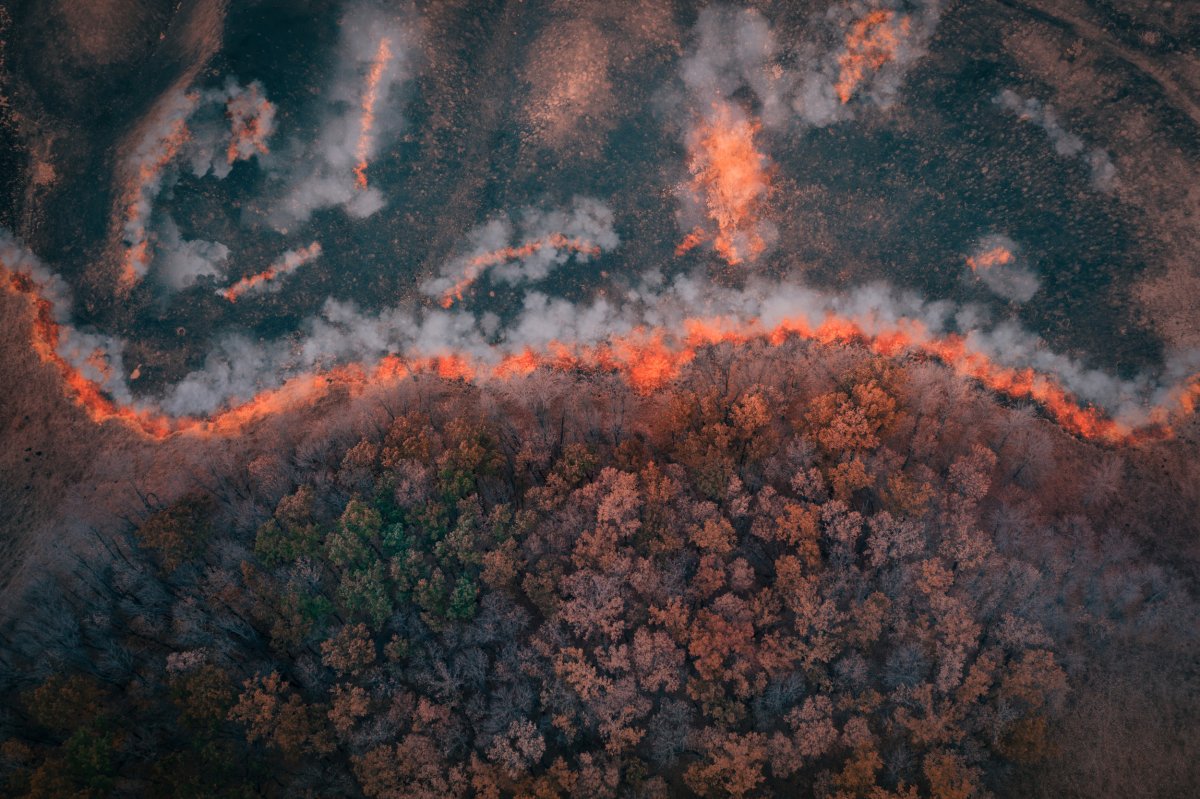The spread of destructive wildfires in forests could lead to wood and paper shortages, scientists have warned.
A new study published in the journal Nature Geoscience reported that as wildfires become more common, it puts timber supply in jeopardy. Between 2001 to 2021, wildfires destroyed timber supplies equivalent to the size of Britain, the researchers said in an article in The Conversation summarizing their findings.
"Wildfire threatens industries such as timber milling and paper manufacturing, and the threat is far greater than most people realize," they wrote.
Wildfires—particularly in the Western U.S, Canada, Siberia, Brazil and Australia—have become more common over the past 10 years.
As timber demand is expected to triple by 2050, researchers at the University of Cambridge in the U.K. and the Australian National University have highlighted the need to adopt urgent new strategies to manage wildfires. Currently, around a third of the world's forests are used for timber supplies, worth $1.5 trillion every year, the researchers reported.
"Any country that generates a large amount of its timber supply through domestic production will be seriously affected if it suffers heavy losses from wildfire," Chris Bousfield, a postdoctoral researcher at the University of Cambridge who worked on the study, told Newsweek.
"The USA, Canada, and Australia are all examples of countries at high risk. They suffer from frequent and large wildfire events, which will increase in frequency and magnitude in the future, whilst producing much of their timber domestically. Future losses could also lead to significant losses in timber export revenues. Where supply is restricted, particularly pitted against the background of increasing global timber demand, it is highly likely we will see substantial increases in the price of timber."
To determine just how much of an impact wildfires are having on timber supply, scientists analyzed maps of logging activity and compared them with wildfire activity, to find out how much timber production fell.

They found that up to 25 million hectares (62 million acres) of timber were burned globally from 2001 to 2021. Wildfires have also increased in more recent years. Before 2015, wildfires burned around 1 million hectares a year. Now, they are burning triple that amount.
Portugal and Australia lost the highest percentage of their forestry land to wildfires. "Such high losses of timber stock will leave a shortfall in internal timber supply, threatening timber-related jobs and probably forcing increased reliance on imports or shifts to faster wood production through plantations," the researchers said.
The problem is that it takes up to 100 years, or sometimes longer, to grow a tree that can be cut for timber. And as wildfires increase, these trees are being destroyed on a rapid scale, more quickly than they can be replaced.
"So the increased frequency of high-severity wildfire means fewer areas of forest will escape fire for long enough to reach timber harvesting age. This is especially problematic where logging makes forests more prone to burning in a high-severity wildfire," the researchers said in The Conversation article. "Furthermore, given the long-term nature of timber production, typically on cutting cycles ranging from 40 years to more than a century, future timber crops will face a very different climate as they mature."
"Our research identifies an extremely important challenge due to the reliance on timber globally, and the projected increase in demand. Timber is a far less polluting construction material compared to other options such as concrete or steel, so if we want to achieve net zero economies then timber will be really important in this transition," Bousfield said. "Against a backdrop of a tripling in timber demand by 2050, at the global scale it could become a major problem in roughly a decade or so, as climate change severity becomes even more pronounced."
Wildfires can happen for a number of reasons, including lightning strikes and human activity, such as arson. However experts believe that they have increased in recent years due to climate change.
According to the U.S. National Integrated Drought Information System, human-caused climate change contributed to a 172 percent increase in burned areas due to wildfires from 1971 to 2021. They also estimate that there will be a further increase in the amount of burned areas in coming decades.
The fear is that lack of timber from forests may force the industry to look to other, tropical forests, that are important for surrounding ecosystems and the conservation of certain species.
The researchers put forward several alternative ways to protect the world's forest and timber, including growing more timber in plantations. According to The Conversation, plantations that are well managed could produce timber within 20 years.
They also urge better protection over timber resources through technology. Some technology is able to detect wildfires more quickly, particularly those that originate from lightning strikes.
"Next we are focusing on how to prevent catastrophic losses of timber to wildfires in the future," Bousfield said. "Increasing temperatures and droughts will increase wildfire conditions, so we need to know how to manage timber production to minimize these impacts. We are starting to predict total timber losses to wildfire under future climate conditions, and whether changing what timber we grow, how, and where, can reduce the risks of fire-induced timber losses."
Update 11/21/23, 04:03 a.m. ET: This article was updated to include comments from researcher Chris Bousfield.
Uncommon Knowledge
Newsweek is committed to challenging conventional wisdom and finding connections in the search for common ground.
Newsweek is committed to challenging conventional wisdom and finding connections in the search for common ground.
About the writer
Robyn White is a Newsweek Nature Reporter based in London, UK. Her focus is reporting on wildlife, science and the ... Read more





